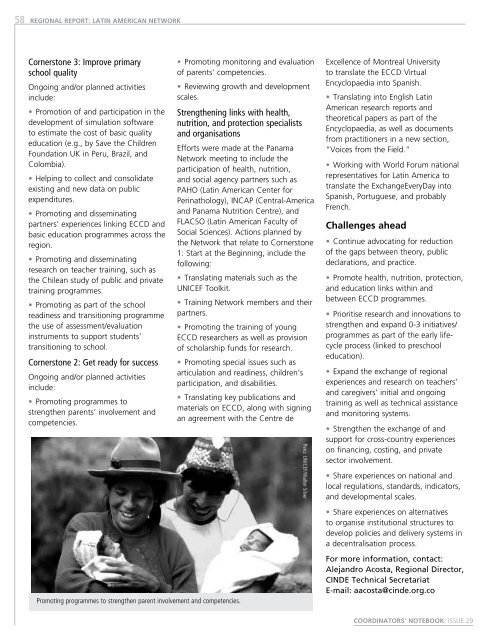A global call to action for early childhood
A global call to action for early childhood
A global call to action for early childhood
Create successful ePaper yourself
Turn your PDF publications into a flip-book with our unique Google optimized e-Paper software.
58<br />
REGIONAL REPORT: Latin American Network<br />
Corners<strong>to</strong>ne 3: Improve primary<br />
school quality<br />
Ongoing and/or planned activities<br />
include:<br />
• Promotion of and participation in the<br />
development of simulation software<br />
<strong>to</strong> estimate the cost of basic quality<br />
education (e.g., by Save the Children<br />
Foundation UK in Peru, Brazil, and<br />
Colombia).<br />
• Helping <strong>to</strong> collect and consolidate<br />
existing and new data on public<br />
expenditures.<br />
• Promoting and disseminating<br />
partners’ experiences linking ECCD and<br />
basic education programmes across the<br />
region.<br />
• Promoting and disseminating<br />
research on teacher training, such as<br />
the Chilean study of public and private<br />
training programmes.<br />
• Promoting as part of the school<br />
readiness and transitioning programme<br />
the use of assessment/evaluation<br />
instruments <strong>to</strong> support students’<br />
transitioning <strong>to</strong> school.<br />
Corners<strong>to</strong>ne 2: Get ready <strong>for</strong> success<br />
Ongoing and/or planned activities<br />
include:<br />
• Promoting programmes <strong>to</strong><br />
strengthen parents’ involvement and<br />
competencies.<br />
Promoting programmes <strong>to</strong> strengthen parent involvement and competencies.<br />
• Promoting moni<strong>to</strong>ring and evaluation<br />
of parents’ competencies.<br />
• Reviewing growth and development<br />
scales.<br />
Strengthening links with health,<br />
nutrition, and protection specialists<br />
and organisations<br />
Ef<strong>for</strong>ts were made at the Panama<br />
Network meeting <strong>to</strong> include the<br />
participation of health, nutrition,<br />
and social agency partners such as<br />
PAHO (Latin American Center <strong>for</strong><br />
Perinathology), INCAP (Central-America<br />
and Panama Nutrition Centre), and<br />
FLACSO (Latin American Faculty of<br />
Social Sciences). Actions planned by<br />
the Network that relate <strong>to</strong> Corners<strong>to</strong>ne<br />
1: Start at the Beginning, include the<br />
following:<br />
• Translating materials such as the<br />
UNICEF Toolkit.<br />
• Training Network members and their<br />
partners.<br />
• Promoting the training of young<br />
ECCD researchers as well as provision<br />
of scholarship funds <strong>for</strong> research.<br />
• Promoting special issues such as<br />
articulation and readiness, children’s<br />
participation, and disabilities.<br />
• Translating key publications and<br />
materials on ECCD, along with signing<br />
an agreement with the Centre de<br />
Peru: UNICEF/Walter Silver<br />
Excellence of Montreal University<br />
<strong>to</strong> translate the ECCD Virtual<br />
Encyclopaedia in<strong>to</strong> Spanish.<br />
• Translating in<strong>to</strong> English Latin<br />
American research reports and<br />
theoretical papers as part of the<br />
Encyclopaedia, as well as documents<br />
from practitioners in a new section,<br />
“Voices from the Field.”<br />
• Working with World Forum national<br />
representatives <strong>for</strong> Latin America <strong>to</strong><br />
translate the ExchangeEveryDay in<strong>to</strong><br />
Spanish, Portuguese, and probably<br />
French.<br />
Challenges ahead<br />
• Continue advocating <strong>for</strong> reduction<br />
of the gaps between theory, public<br />
declarations, and practice.<br />
• Promote health, nutrition, protection,<br />
and education links within and<br />
between ECCD programmes.<br />
• Prioritise research and innovations <strong>to</strong><br />
strengthen and expand 0-3 initiatives/<br />
programmes as part of the <strong>early</strong> lifecycle<br />
process (linked <strong>to</strong> preschool<br />
education).<br />
• Expand the exchange of regional<br />
experiences and research on teachers’<br />
and caregivers’ initial and ongoing<br />
training as well as technical assistance<br />
and moni<strong>to</strong>ring systems.<br />
• Strengthen the exchange of and<br />
support <strong>for</strong> cross-country experiences<br />
on financing, costing, and private<br />
sec<strong>to</strong>r involvement.<br />
• Share experiences on national and<br />
local regulations, standards, indica<strong>to</strong>rs,<br />
and developmental scales.<br />
• Share experiences on alternatives<br />
<strong>to</strong> organise institutional structures <strong>to</strong><br />
develop policies and delivery systems in<br />
a decentralisation process.<br />
For more in<strong>for</strong>mation, contact:<br />
Alejandro Acosta, Regional Direc<strong>to</strong>r,<br />
CINDE Technical Secretariat<br />
E-mail: aacosta@cinde.org.co<br />
COORDINATORS’ NOTEBOOK: ISSUE 29
















